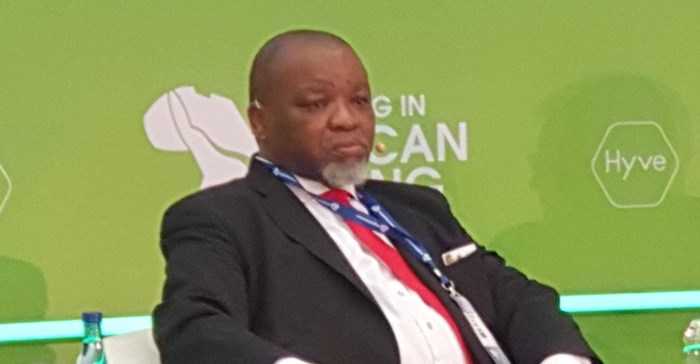The Department of Mineral Resources and Energy (DMRE) indicated that 235 mining rights; 2,485 prospecting rights; 1,644 mining permits; 238 Section 11 change of ownership transfers; and 724 licence renewals are currently backlogged.

Minerals and energy Gwede Mantashe
Based on a survey of Minerals Council members representing over 170 mining company right applications conducted in December 2020, mining companies that are members of the Minerals Council have projects worth about R20bn that have been prevented from being developed due to slow government processes including delays in the approval of permits and mining right transfers, and the issuing of water-use licences and environmental permits.
The projects identified include exploration and mining operations, some of which have been delayed for two to three years, and some for even longer. The survey excluded potential projects companies have not progressed yet through their investment committees, and expenditure on self-generation power projects to supplement electricity supply from Eskom, which is the subject of a separate process between the DMRE and Minerals Council.
“In mid-2020, during the height of the Covid-19 lockdown, the minister of mineral resources and energy and Minerals Council office bearers agreed on a crucial process to revive mining in the 'new normal'. A series of task-teams were established to resolve various issues including regulatory constraints and backlogs, policy challenges and infrastructure constraints.
The Minerals Council has taken a very practical constructive, problem-solving approach to addressing the issue of licence delays and in the one-stop-shop task team has submitted all the relevant details of the 170 plus right applications listed above, with a practical focus on how to get these blockages resolved as expeditiously as possible. We continue to engage with DMRE director-general, Thabo Mokoena on ways to prioritise the issuing of outstanding licences," says Minerals Council CEO, Roger Baxter:
The Minerals Council has made the following suggestions on critical reforms required to encourage greater investment in exploration and mining to the DMRE:
- Discarding the dysfunctional Samrad application system and develop a brand new, transparent and reliable online mining cadastral system;
- Ensure the entire licensing system is electronic, with proper receipts for documents uploaded and timeframes within which feedback must be provided and licences issued;
- Ensuring that any corruption or malfeasance is reported;
- Addressing ambiguities in the law;
- Halving licensing times; and
- Regular reporting by the DMRE on licences applied for, granted and refused to ensure full transparency.
“An open and transparent cadastre system is an essential component of a modern mining economy. Many of the mining jurisdictions in sub-Saharan Africa have them – Botswana and Zambia are examples. It certainly would assist in attracting investment, along with tax incentives for exploration. It is crucial to manage and grow exploration as well as to reduce red tape when issuing licences and permits.
“Some of the ideas contained in the task team discussions with the DMRE have found expression in the Economic Reconstruction and Recovery Plan announced by President Ramaphosa on 15 October 2020. These include the critical need to halve licensing times and the development of a new exploration plan.
“A lot of work has been done by stakeholders, including the DMRE, the Council for Geosciences, the Minerals Council and other partners to develop an exploration plan. Once finalised in the not-too-distant future, we believe this will be a game-changing plan. We await guidance from Minister Mantashe and Director-General Mokoena,”Baxter says.






























